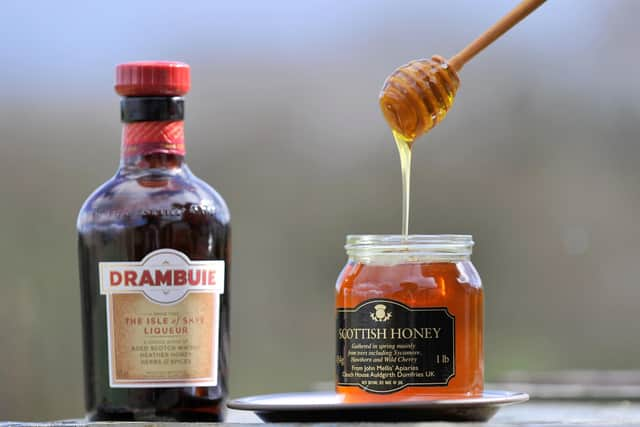The history of Drambuie - from Bonnie Prince Charlie to modern day liqueur
and live on Freeview channel 276
There are a few drinks in Scotland that feel like they’ve been around forever. They pepper the memory – from trying a sip at Hogmanay or parties to the familiar bottles that line bar gantries around the world, like old friends.
One such drink is Drambuie – a honey whisky liqueur that has stood the test of time despite different ownership.
Advertisement
Hide AdAdvertisement
Hide AdA blend of whisky, heather honey, herbs and spices, its name is derived from the Gaelic phrase “an dram buidheach”, meaning "the drink that satisfies". Legend has it that Bonnie Prince Charlie gave the recipe to Captain John MacKinnon of the clan MacKinnon in return for sanctuary on the Isle of Skye, where he fled after the Battle of Culloden in 1746.


The recipe was then given in the late 19th century to James Ross, who ran a hotel on Skye, where he developed the recipe and began selling it to patrons in the 1870s, with the name being registered as a trademark in 1893.
Ross's widow was obliged to sell the recipe to make ends meet, and did so to another – unrelated – family named MacKinnon, who began producing the drink in its current form in Edinburgh in 1910.
In 1916 Drambuie became the first liqueur to be allowed in the cellars of the House of Lords and was shipped to British soldiers stationed around the world. The brand was sold in 2014 to William Grant & Sons for a rumoured £100 million.
Advertisement
Hide AdAdvertisement
Hide AdWilliam Grant & Sons master blender Brian Kinsman is now the one in charge of making the famous liqueur and is only one of three people that know the drink’s “secret essence” or recipe.
“If I told you what it was, I’d have to kill you,” laughs Mr Kinsman, who started out in the business as a chemist in the laboratory in the grain distillery in Girvan. He was part of a team that looked at spirit quality, from a chemistry perspective, but he got involved with the sensory side too.
This led to him working closely with former master distiller David Stewart before taking over from in 2009.
When it comes to creating Drambuie, the three people in the know get together about two or three times a year and recreate the secret essence.
Advertisement
Hide AdAdvertisement
Hide AdMr Kinsman says: “I’ve got a handwritten recipe in the safe in the office. It’s all natural flavours and oils that we mix together and it’s phenomenally strong. The essence we create will go on to make somewhere in the region of half a million bottles of Drambuie.”
Mr Kinsman is proud the brand is still going strong, and that it can act as a sweeter way for those looking to get into whisky drinking.
He said: “It's a natural product – heather honey, this secret essence, blended scotch whisky, a bit of saffron that gets added for colour and sugar. It’s a very indulgent drink, but it's got the whisky cues which are rounded off because of the sweetness. It’s a great drink for those curious about whisky.”
Hear more from Mr Kinsman on the Burns night episode of our podcast Scran, available wherever you get your podcasts.
Comment Guidelines
National World encourages reader discussion on our stories. User feedback, insights and back-and-forth exchanges add a rich layer of context to reporting. Please review our Community Guidelines before commenting.